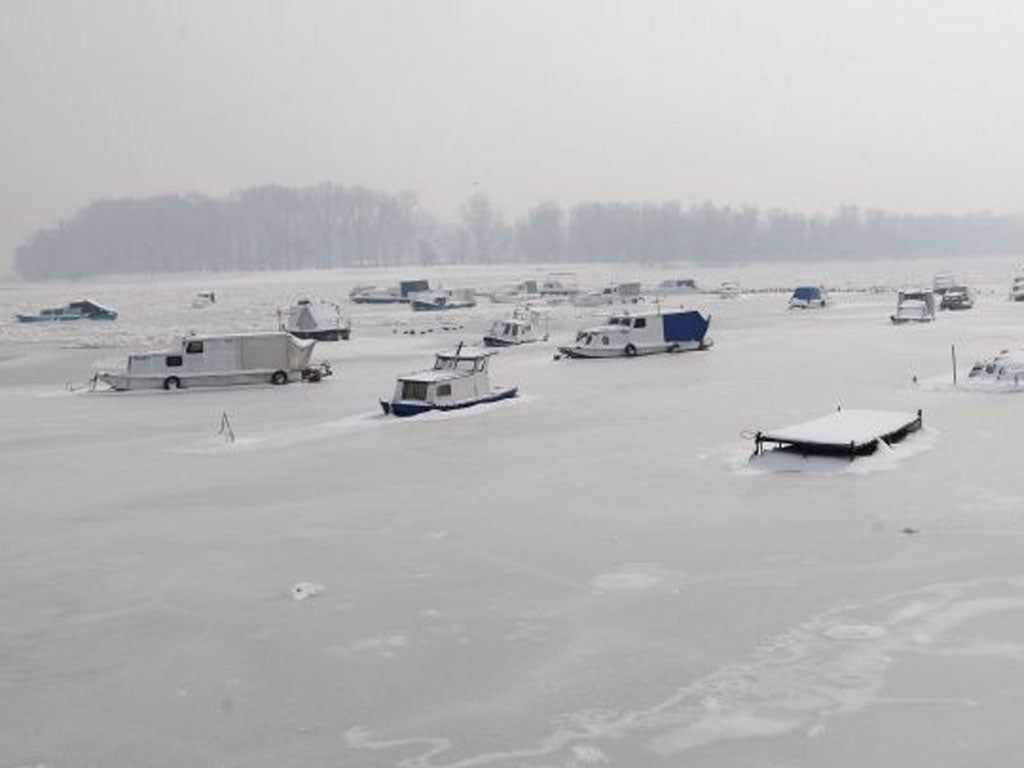Cold down the river Danube
Hundreds of miles of Europe's busiest waterway are frozen solid – and from Bavaria to Bulgaria, the continent's economy is seizing up too. Tony Paterson reports from Berlin

It has been dubbed Europe's Amazon – but yesterday any comparison with the tropical South American river seemed ridiculous. Instead, the "Blue Danube", commemorated by Johann Strauss with a waltz of the same name, resembled the arctic, covered in a dense carpet of ice stretching for hundreds of miles. Dynamite had to be used to blow apart ice floes in a desperate attempt to prevent catastrophic flooding.
The result is that hundreds of ship-like container barges that normally plough the length of the continent's busiest waterway have been confined to port. The authorities yesterday said that traffic from upstream Austria had come to a virtual standstill to its river's mouth on the Black Sea.
The culprit is the cold front – disastrously nicknamed "Cooper" by the German auto-makers BMW in an attempt to advertise its latest Mini Cooper car – which has plunged central and south-eastern Europe into a harsh and unexpected winter of near Siberian proportions for nearly a fortnight.
Via Donau, the body responsible for co-ordinating traffic movement in all nine countries through which the 1,780-mile river flows, said: "For the Danube to freeze we need temperatures of under -10C for a week. That is currently the case."
With temperatures on the continent reaching a low of -33C, the Danube has emerged as one the winter's major victims. Ice floes on the stretch of river that flows through the Serbian capital Belgrade are currently up to half a metre thick and all vessels seeking to pass along the country's 600km of waterway are harbour-bound.
Yesterday the Serbian authorities mobilised the country's armed forces to address the problem. Military explosives experts were busy dynamiting the pack ice on some sections of the river because of fears that a quick thaw could bring about severe flooding.
"We need a slow thaw of around 5C so that the snow melts slowly and causes no bigger problems," said Aleksandar Prodanovic, a Serbian flood control expert.
Upstream in Croatia, an operation was mounted to rescue the crew of a barge trapped in the ice near the main Danube port of Vukovar since last Friday. The three men on board had run out of food.
Downstream in Bulgaria, the authorities have also banned navigation on the river. A total of 224 vessels are reported to be harbour-bound in six river ports.
In Romania, the river is completely frozen along two stretches of more than 100km each, while in Hungary, navigation is being severely hampered by ice floes covering between 60 and 70 per cent of the river's surface.
The Danube's big freeze comes only two months after it experienced its worst drought in 200 years, in November and early December. The mild, almost spring-like weather seen across the region before Christmas produced virtually no rain in the region. As a result, the flow of the Danube was reduced to a trickle in many places and shipping was cut to a mere 25 per cent of its usual volume for more than a month.
Barge captains with decades of experience said they had never seen the river level drop so low. In early December, Branko Savic, the manager of a Danube shipping company, said: "Traffic on the Danube is practically non-existent. We are in dire need of enormous amounts of water, rain or melting snow."
But the last thing he expected was freezing snow and ice. Yet the drought and the river's current big freeze have come as a reminder of the Danube's role as a barometer of climate change.
The economic impact of the freeze has yet to be fully estimated, but it is also certain to be significant. The collapse of communism in most of the countries through which the mighty river flows has led to a substantial increase in its use as a trade route. Political changes have also turned the Danube into the dividing line between the richer countries of Western Europe and the struggling states at its eastern reaches. To get a sense of the commercial importance of the waterway, consider this: in 2010, 11.1 million tonnes of goods were transported via the Austrian section of the Danube alone. That was up from 1.7 million tonnes on the figure for 2009.
The most significant commercial development to affect the river since communism's collapse has been the 171km long Rhine-Main -Danube canal which was completed in 1992. The canal has turned the river into a vast trans-European waterway linking the North Sea port of Rotterdam with Sulina on the Black Sea.
The river has since been earmarked as one of 10 pan-European transport corridors in central and Eastern Europe that require major investment; international experts are due to meet in Vienna next month to discuss EU plans to increase financing for the region. However, increasing environmental awareness has so far stopped plans to build bigger locks on upper stretches of the river, which would give barges longer than the current maximum 300ft access to the entire length of waterway.
Join our commenting forum
Join thought-provoking conversations, follow other Independent readers and see their replies
Comments